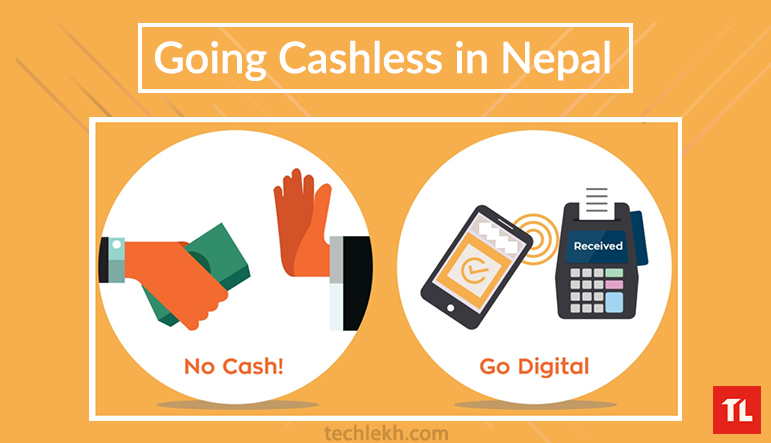The future is unpredictable. When we talk about the time ten years back and now, we see a great leap in technology. Take for example, the small handheld objects that we hold every day and perform almost everything possible: Smartphones! Ten years back, I remember owning a Personal Computer (PC) with 1 GB of RAM. Now, we have smartphones with 1 GB or more RAM, let alone PCs.
Coming to the point, our transactions have begun taking place via forms of money that aren’t hard-cash. We pay for various items via our cell phones, laptops or cards. Technological advancements have surely played a very important role in achieving this. It is a safer method to conduct bulky transactions since it does not require us to carry hard-cash with us.
SEE ALSO: Electric Vehicles, The Right Choice for Nepal?
However, compared to the International context, Nepal hasn’t managed to grow that cashless-transaction-friendly environment. For example, Nepalis face difficulties due to the lack of proper setups for International transactions. We can hope to eradicate problems like this in the near future.
E-banking around us
Banking was started in Nepal by Nepal Bank Limited back in the year 1937, with metallic coins worth NRs. 10 million as the authorized capital. When we talk about credit cards, the first ones were introduced by Nabil Bank in 1990. 5 years later, Himalayan Bank introduced the ATM culture with the first Automated Teller Machine (ATM), along with Telephone banking in Nepal (Source).
Kumari Bank was the first in introducing e-banking services in 2002, later joined by Laxmi Bank which introduced SMS-banking in 2004. The current available options for e-banking in Nepal are ATMs, Point of Sales (PoS) systems, telephone banking, Internet banking and mobile banking.
E-banking has facilitated the processes involving cash to a great extent. For example, we can avoid the risk of losing hard cash anymore, thanks to card and online payment methods. Information regarding the balance can also be known without having to visit the organization’s office(s) either. You get the entire control of your account and all the change(s) made in it is directly informed to you instantly. For instance, when you withdraw some cash from your account, you’re notified immediately via Email or SMS. Paying utility bills had never been easier as well.
Khalti, an E-wallet in Nepal
Digital wallets or E-wallets are a method of performing monetary transactions through electronic devices. Digital wallets have become an easy way to keep track of your account’s activities and make payments.
SEE ALSO: Nepal’s Future in Artificial Intelligence
Khalti is among the few e-wallets that are available in Nepal. Although it is comparatively newer than other e-wallets such as eSewa and iPay, it is quickly gaining momentum in the Nepali market. Khalti offers an easy registration and loading process. It also offers features like mobile top-up, ADSL payment, Khanepani bill payment, movie/hotel booking and Worldlink bill payment to name a few. This is all a relief to customers, since they don’t need to stay on a queue for menial tasks.

Khalti and the current scenario e-banking in Nepal has managed to raise a few questions in my mind and to get answers to them, I got a chance to consult Mr. Amit Agrawal, the CEO/Director at Janaki Technology Pvt. Ltd., a company that introduced Khalti and other services like Sparrow SMS and Picovico.
TechLekh: What future of cash do you see in the context of Nepal?
Mr. Agrawal: Cash is here to remain for long. I don’t see a purely cashless society immediately. It will actually start from “less-cash society” first. However, we are on a mission for a Cashless Nepal.
It will take some time, but as we are not a huge economy, once the habit builds, it will be in place quickly. Also, we are expecting exponential increase in use of Smartphones, 4G, Internet and mobile wallets. These will be driving factors for a Digital Nepal.
TechLekh: What kind of response have you received from Khalti users?
Mr. Agrawal: We have received an outstanding response. Within one year, we have reached 100,000 users including Android, web and iOS. We had not expected such an overwhelming response for a wallet; it takes a lot of time to add partnerships with BFIs (Banking & Financial Institutions) and Merchants/Service Providers. Despite having limited banks, we received an overwhelming response from our users.
We would like to thank our users for all their love. First year went by in the blink of an eye. We could add only 5 banks. However, now most banks are interested in integrating with Khalti and we are getting calls/emails from most of the banks for the same. We will add all major BFIs in Khalti, within 2018. You can feel the difference in user experience by using the app yourself. You can download and sign up for Khalti at https://khalti.com/app.
TechLekh: How efficient do you think Khalti is in the Nepali market? Are there some new changes/policies that you have been waiting to introduce?
Mr. Agrawal: The response that we have received and reaching 100,000 users within a year of beta launch shows that Khalti is efficient in market. We are not waiting for any policies. We have already received “Letter of Intent” for PSP (Payment Service Provider) and soon we will be processing for LOA (Letter of Approval). We are fully compliant as per NRB (Nepal Rastra Bank) guidelines.
There is a lot more to do. We need to work harder to add features and services in Khalti. Our mission is to bring ‘access to finance’ to all Nepalese, including those living even in the remotest area of Nepal. With support from users, we hope to make our dream true, even before our estimated time.
TechLekh: What are the shortcomings faced by Khalti at the current moment?
Mr. Agrawal: Our main challenge in the first year was adding banks. As Khalti is a payment service, it needs funds to be added for payments. For the same, we need to integrate with many banks.
The problem is, most banks are themselves going through their own technology transition phase or other works like mergers, or implementing AML (Anti Money Laundering) softwares and hence they were busy. Also, due to many wallets emerging in market, it was difficult for banks to trust us initially. However, banks have started believing in us and are excited to integrate Khalti.
TechLekh: There are various problems faced by freelancers in the context of online transactions, for example, PayPal does not work in the context of Nepal. Does your company also work in solving the problem up to some extent?
Mr. Agrawal: Technology is not the solution or limitation for anything. There are other factors like National economical status, Forex Deficit etc that does not allow Nepalese to send money abroad. Receiving money is not a big problem (we have already introduced our Payment Gateway; you can find documentation at https://docs.khalti.com, it will soon have feature of accepting various Cards from all around the world, and the money will come to your Khalti or bank account in Nepal directly).
So, Khalti can be alternate solution for receiving money by freelancers. Sending money outside Nepal has to be first approved from Policy Level and that can only happen when we have sufficient forex reserve, which is ultimately tied to our export of goods and services.
TechLekh: What in your opinion should the government do in the sector of online transactions?
Mr. Agrawal: Government should encourage merchants to come online and provide necessary support and incentives or taxation relief to merchants for coming online. We are expecting National switch and RTGS (Real Time Gross Settlement) service soon.
It would be great if we could have a unified payment system (like UPI or Bheem of India). Government should also come up with mass awareness campaigns encouraging people to go cashless.
In a true sense, e-transaction isn’t only meant for urban areas. Talking about the inaccessibility of facilities in the rural areas, if e-transactions and other e-services could be promoted there, it’ll be a huge relief to the inhabitants of such areas. Considering the rough terrains at various places in Nepal like Humla and Jumla, e-transactions could be a good method to reduce the burden of travelling.
A change expected in the conventional way of dealing with cash will definitely take some time, but will eventually end up facilitating our daily lives. Let us together promote cashless future!
Editor’s Recommendations
- Nepal’s Future in Artificial Intelligence
- Nepal and Cyber Security: A REVIEW
- Nepali Youths Prone to Cell Phone Addiction
Thanks for being with us. Keep reading such articles on TechLekh!
-
Bajaj Pulsar NS 160 Price in Nepal (July 2025 Updated)HIGHLIGHTS Bajaj Pulsar NS 160 BS6 price in Nepal is Rs. 3.93 Lakhs. Pulsar NS…
-
EXCLUSIVE: Galaxy Buds Core is Here in Nepal – Samsung’s Cheapest TWS with ANCHIGHLIGHTS Samsung Galaxy Buds Core price in Nepal is Rs. 7,399. The earbuds feature a…
-
Honor X6c with 120Hz Refresh Rate and IP64 Rating Launching in Nepal SoonHIGHLIGHTS The Honor X6c price in Nepal could be Rs. 20,999 (6/128GB), Rs. 22,999 (6/256GB),…














